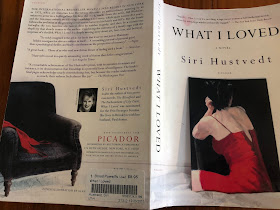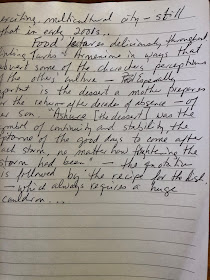After reading Jesmyn Ward's Salvage the Bones and Ali Smith's Spring last month, both wonderful, even important, books. . . but emotionally and mentally demanding. . . I enjoyed the palate-cleansers noted in the photo above: Mick Herron's London Rules and Cara Hunter's Close to Home. I can't explain why mysteries (and sometimes thrillers -- Herron's "Slough House" series is more thriller, than mystery, and I've loved every one!) are my escape genre of choice. . . .

But palate cleansed, I was ready for something a bit more complex in taste and texture, and Siri Hustvedt's What I Loved was on top of the To Be Read pile, waiting patiently since I'd picked it up at Powell's Books in Portland back in January. . .
So, so much I loved about this book, and I could reread it tomorrow happily. I posted on Instagram that I was reading it and got several comments from other readers who had read it, loved it, and remembered it well long after.
Highly recommended. . . . Also recommended, for very different reasons, is Ibram X Kendi's How To Be An Anti-Racist. The title might suggest a polemic; to me it signals instead the book's directness and practicality -- and the "how-to" book reference also suggests an engaging self-reflexivity and humour and humanity, and even a sense of "hope against hope" combined with a "we're all in this together; can we roll up our sleeves and get to it." I've been reading this out loud to my husband as he cooks dinner over the last few weeks and I'm surprised how galvanizing it's been for him. As an academic working in the humanities, much of what Kendi says is familiar to me, although he's opened my eyes and offered new lenses to me as well. For Paul, I'd say some of the way Kendi frames the distinction between racism and anti-racism is close to transformational.
And then Jesmyn Ward's Men We Reaped. She was another writer we were to have heard her speak at University of British Columbia's Chan Centre in early March. . . and then Covid-19. . . .Since then, I've read two of her novels and this honest, painful, determined memoir. . . .such an important voice. She tells tough truths about our world, about racism and its effects in America, but she will also reward the reader's willingness to witness truth by offering complex, fully human characters and engaging narratives and well-observed settings, the ugliness of poverty peeled back to reveal beauties in landscapes we tend not to see.
So yes, Also recommended.
And Elif Shafak's The Bastard of Istanbul (which I photographed for Instagram against the background of a sweater I'm knitting -- because Look at those coordinated colours!
I discovered Elif Shafak through someone in this circle who was reading Ten Minutes and Thirty-Eight Seconds in This Strange World , I think -- Dottoressa, was it you? Or Mardel? Both of you?
I knew so little about Turkey/Istanbul before that novel, although I knew that its politics have become increasingly intolerable and that Shafak has been very brave in writing as she does. Despite its tragic premise (a prostitute has been beaten and left to die, but remembers her life in the 10 minutes, 38 seconds that her brain functions after her heart stops beating) hat novel introduced me to a lively city and culture, to wonderfully entertaining and likeable characters, and to a range of humour and of sadness and horror and despair and joy. . . . all wrapped in vivid, energetic prose. I wanted more. . . .
So picked up a couple of novels back in January, that same visit to Powell's Books. The Bastard of Istanbul was written about fifteen years ago in a different political landscape than now, but still restrictive enough that Shafak was charged with "denigrating Turkishness."
You could read for yourself to see if you think she does that. In fact, I'd say she celebrates Turkishness (depending how you might define that word/concept) by questioning it. And the writing! Some reviewers complain about the contrivances of the plot here, about the phantasmagorical playing a role . . . issues of credibility. I don't think the novel is as tightly or neatly structured as 10 Minutes. . . but for me it seems to tap into a tradition that I know little of -- the Turkish (and/or Armenian) tradition of folk tales, of story-telling. . . .
So I would recommend this rollicking big story, but with the proviso that it isn't for everyone. (although it's so much Fun!! Go for it ;-)
That's my last few weeks' reading. Now I'd love to hear what you've been reading, and also happy to read anything you have to say about what I've written in this post. . .






